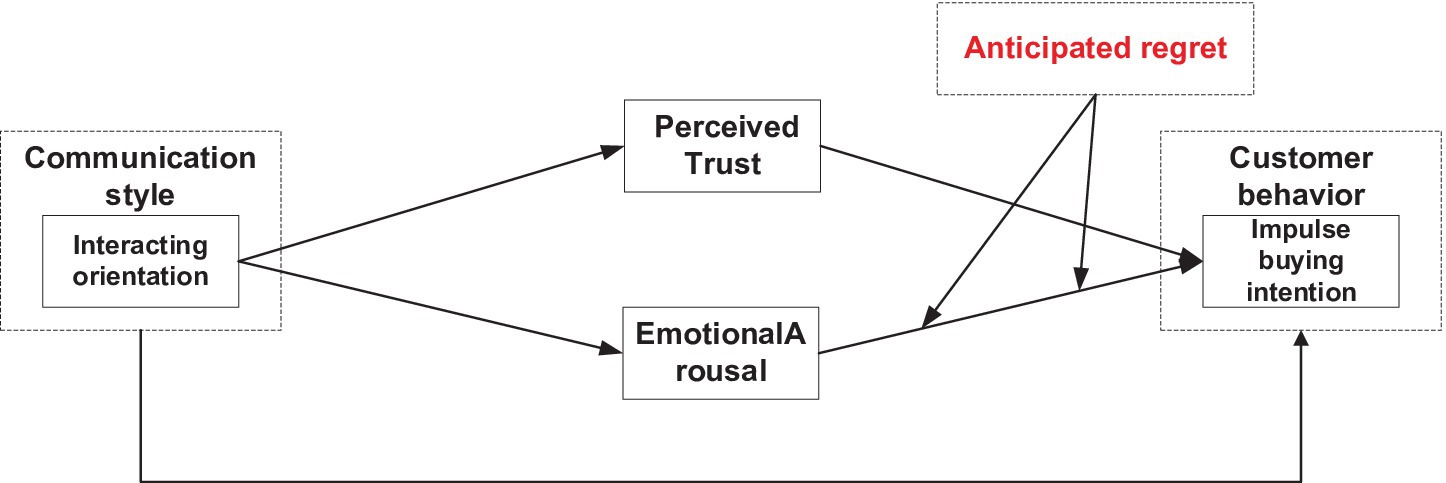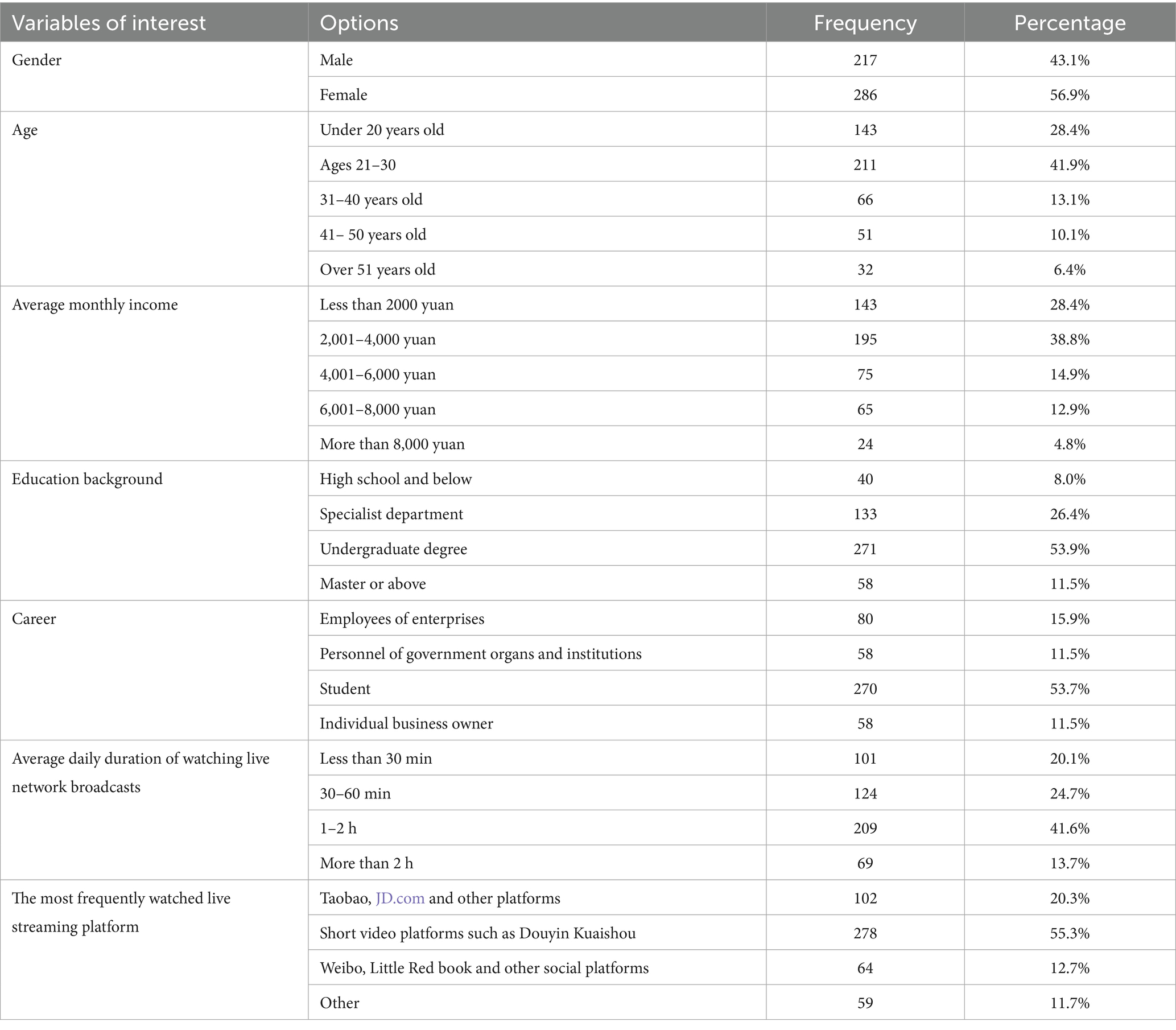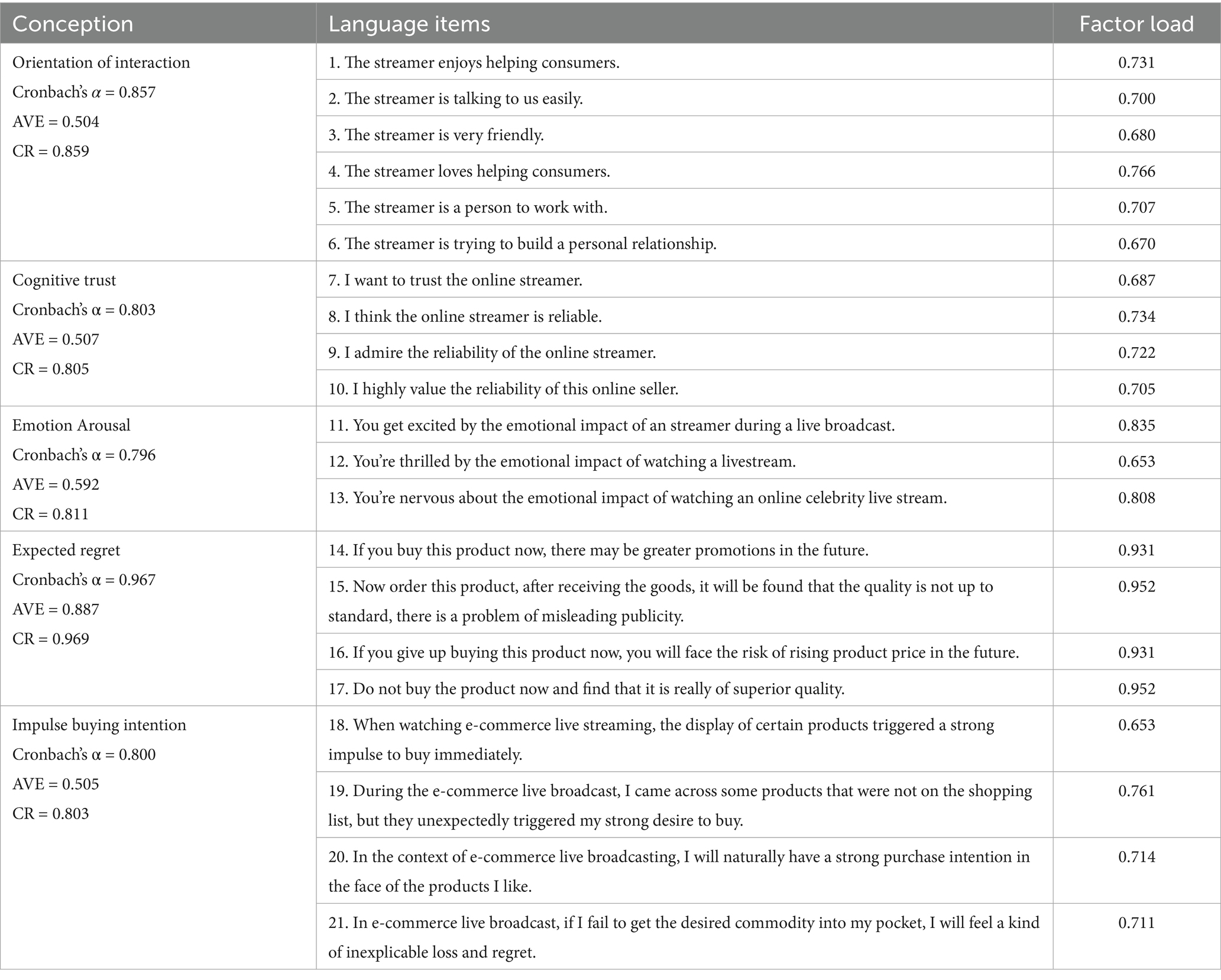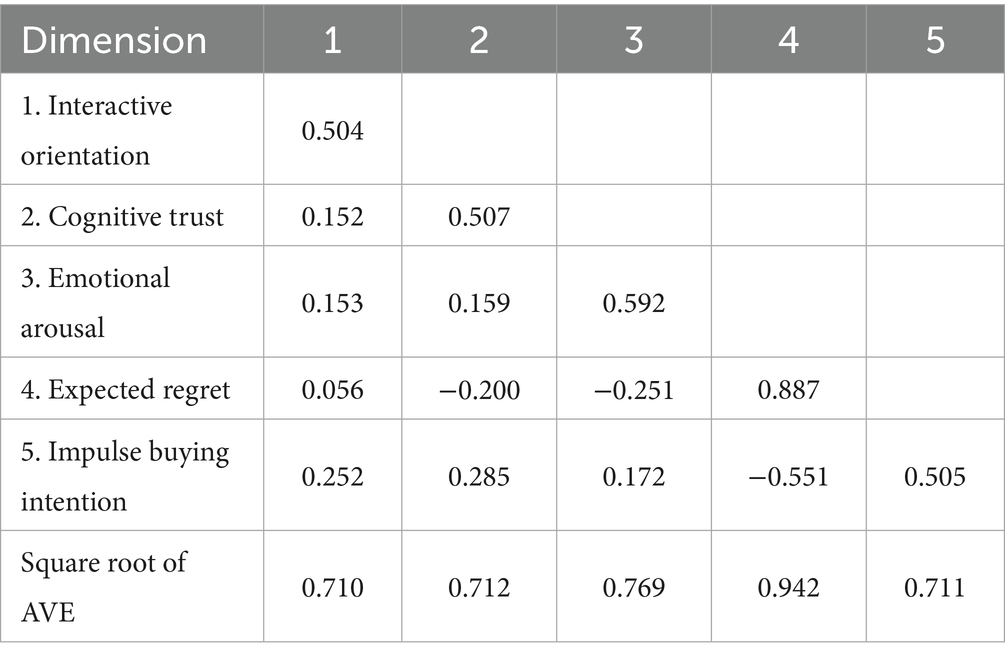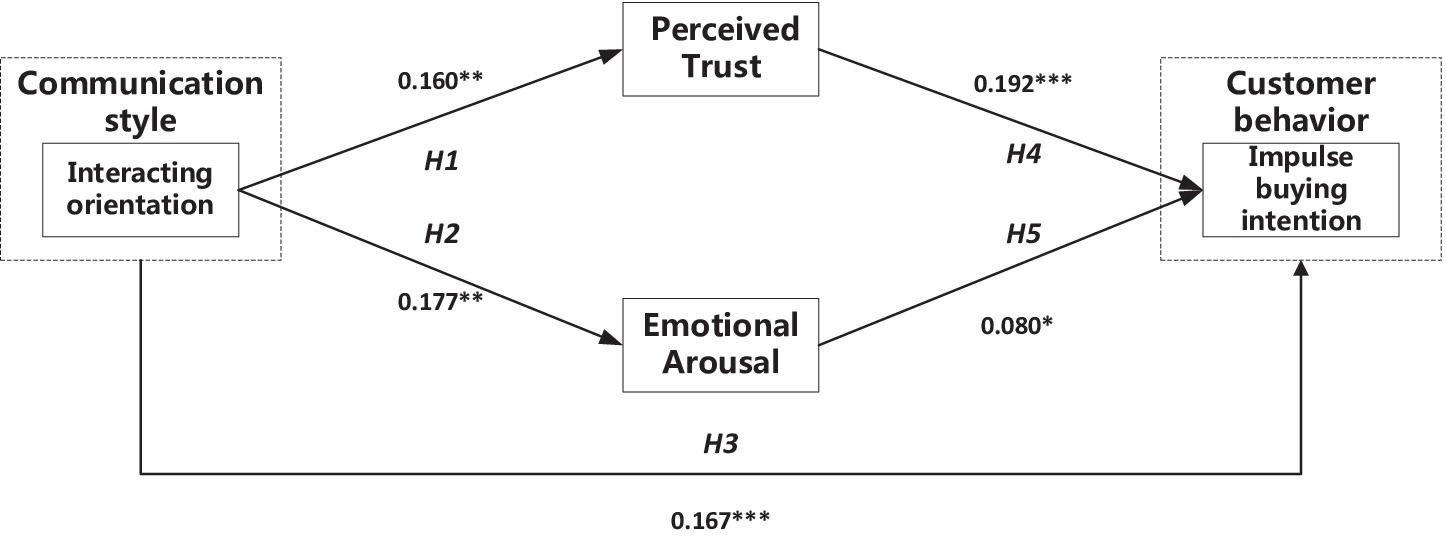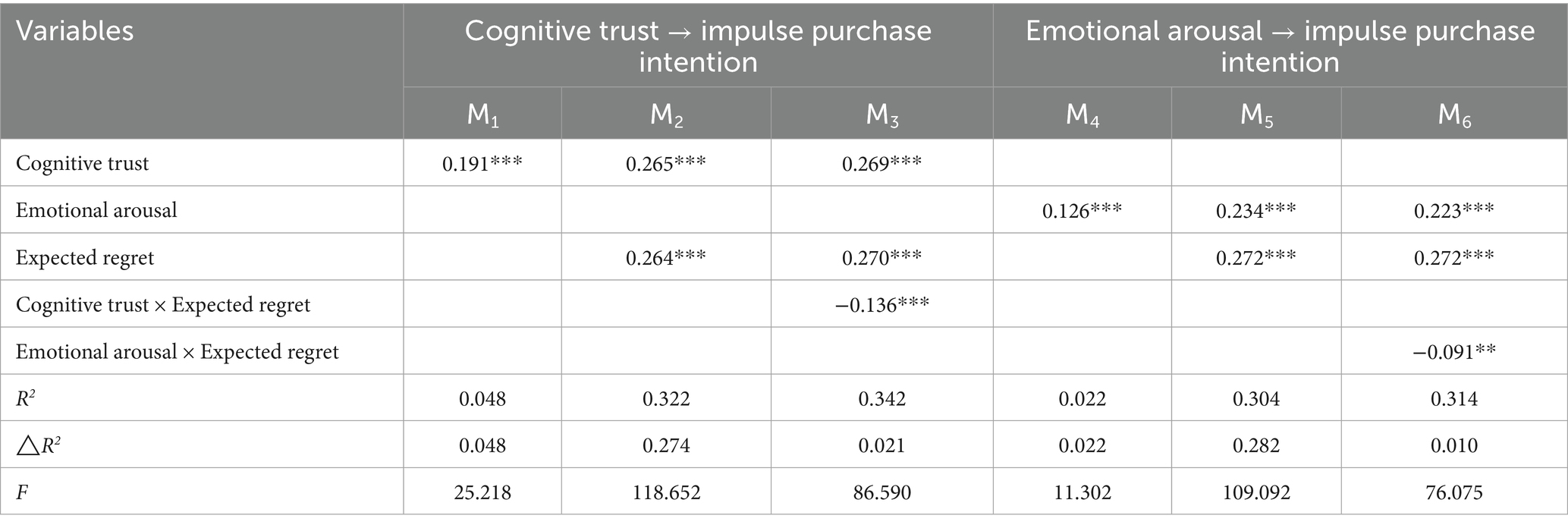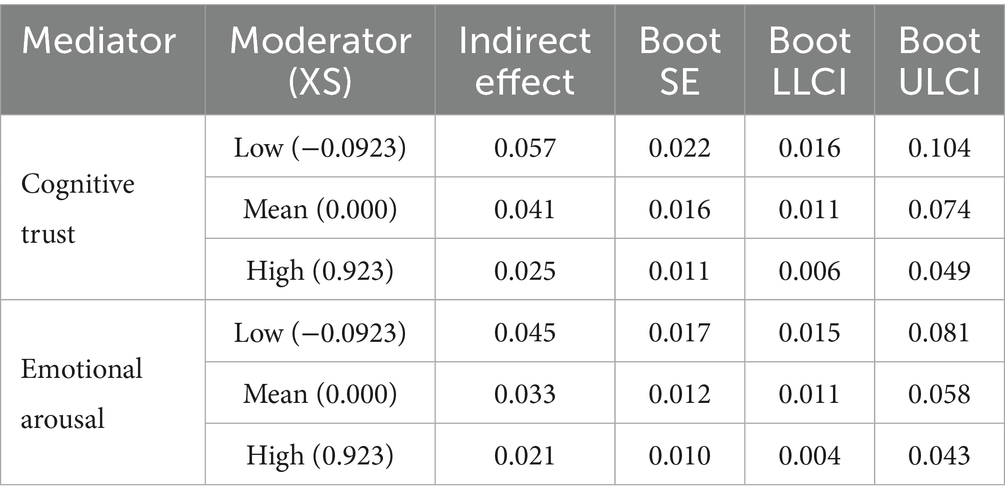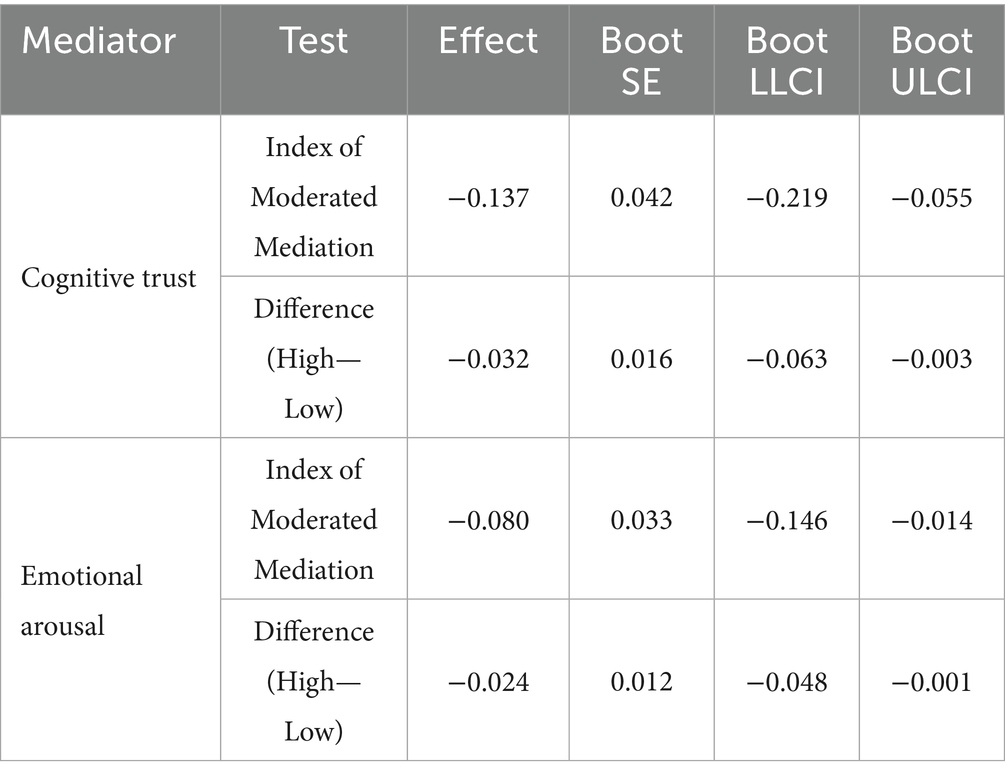- 1School of Management, Hebei GEO University, Shijiazhuang, China
- 2College of Business Administration, Capital University of Economics and Business, Beijing, China
Introduction: Online shopping’s convenience often drives impulsive buying, yet the associated regret emotions pose challenges for consumer satisfaction and businesses’ long-term customer relationship management. This study investigates how streamer interaction orientation influences impulsive buying intentions through cognitive trust and emotional arousal, incorporating anticipated regret as a moderating factor.
Methods: Grounded in cognitive-affective system theory and regret theory, this study analyzes 503 screened responses using structural equation modeling and the Bootstrap method to examine the relationships among streamer interaction orientation, cognitive trust, emotional arousal, anticipated regret, and impulsive buying intentions.
Results: The findings reveal that anticipated regret significantly amplifies the direct effects of cognitive trust and emotional arousal on impulsive buying intentions. Additionally, cognitive trust and emotional arousal mediate the relationship between streamer interaction orientation and impulsive buying intentions, with their mediating roles strengthened by anticipated regret.
Discussion: This study introduces a novel moderated dual-mediation model, enriching the theoretical understanding of impulsive buying antecedents. It extends the application of anticipated regret in consumer behavior and provides actionable insights for optimizing marketing strategies and consumer experiences in live-streamed e-commerce.
1 Introduction
Live-stream e-commerce is a dominant e-commerce model, known for its interactivity, immediacy, and convenience (Yang et al., 2024). However, this model fosters impulsive purchasing behaviors, often driven by streamers’ emotionally charged and personalized communication strategies, leading to significant challenges such as high return rates ranging from 30 to 50%—substantially higher than the 10 to 15% typical in traditional e-commerce (Lee and Chen, 2021). Impulsive purchases often lead to post-purchase regret, lowering consumer satisfaction and raising business risks. Despite extensive research on factors like influencer popularity, product scarcity, and time pressure in live-stream commerce (Guo et al., 2022; Barton et al., 2022), there remains a critical gap in understanding how anticipated regret influences consumers’ cognitive and emotional processes, and subsequently their impulsive buying intentions. This study addresses this gap by investigating the role of anticipated regret in shaping consumer decision-making in live-stream e-commerce, using the Cognitive-Affective System Theory and Regret Theory to explore how streamer interaction orientation affects impulsive buying intentions through cognitive trust and emotional arousal.
Live-stream e-commerce follows traditional platform e-commerce, social e-commerce, and content-based e-commerce, with its market share approaching 20% and exhibiting rapid growth (Singh and Vijay, 2024; Bai et al., 2024). This model has gained favor among businesses and consumers due to its unique attributes (Yang et al., 2024). However, two primary challenges persist. First, streamers often employ emotionally charged and personalized language to drive impulsive purchases, which may not align with consumers’ rational evaluations (Lee and Chen, 2021). Second, the high return rates in live-stream e-commerce, driven by post-purchase regret, lead to resource wastage and decreased customer satisfaction. Addressing these challenges—stimulating demand while minimizing regret and enhancing consumer satisfaction—is critical for the sustainable development of live-stream e-commerce.
Impulsive buying refers to spontaneous consumption behavior driven by momentary desires without thorough evaluation of product necessity (Karl et al., 2021). Research indicates that up to 80% of certain product purchases may be impulsive (Wang et al., 2020). In live-stream e-commerce, spatial limitations prevent consumers from physically experiencing product quality, increasing decision uncertainty and anticipated regret (Gupta and Mukherjee, 2022). While prior studies have explored external triggers of impulsive buying, such as influencer popularity and time pressure, the role of anticipated regret in modulating cognitive and emotional responses remains underexplored.
Emotions and cognition are pivotal in consumer psychology, with emotions being subjective and affective, and cognition being rational and objective. In live-stream e-commerce, these manifest as cognitive trust in the streamer and emotional arousal from interactive experiences (Chen et al., 2024; Ma et al., 2024). Streamers’ interaction-oriented communication fosters an engaging atmosphere, heightening emotional arousal and impulsive purchase intentions, or promoting rational decisions through objective information (Yang et al., 2022).
This study contributes to the literature by evaluating the effectiveness of streamer interaction orientation in live-stream commerce through a novel moderated dual-mediation model. It examines how anticipated regret moderates the pathways of cognitive trust and emotional arousal, offering theoretical insights into consumer decision-making and practical guidance for e-commerce platforms to enhance consumer experiences and optimize profitability. To address the identified research gap, this study pursues the following research objectives:
RQ1: How does streamer interaction orientation influence consumers’ impulsive buying intentions in live-stream e-commerce.
RQ2: What are the mediating roles of cognitive trust and emotional arousal in the relationship between streamer interaction orientation and impulsive buying intentions?
RQ3: How does anticipated regret moderate the pathways of cognitive trust and emotional arousal in shaping impulsive buying intentions?
2 Literature review and theoretical basis
2.1 Overview of live-stream E-commerce literature
Live-stream e-commerce studies have explored factors like influencer popularity, product scarcity, and time pressure that drive impulsive buying (Guo et al., 2022; Barton et al., 2022). However, these studies primarily focus on external triggers, often overlooking the internal cognitive and emotional processes that drive consumer behavior, particularly the role of anticipated regret. While some research acknowledges post-purchase regret as a consequence of impulsive buying (Xin et al., 2024), the pre-purchase emotional dynamics, such as anticipated regret, remain underexplored, creating a significant gap in understanding how these emotions shape decision-making in real-time, interactive settings like live-stream e-commerce. This study bridges this gap by integrating Cognitive-Affective System Theory and Regret Theory to examine how streamer interaction orientation drives impulsive buying via cognitive trust and emotional arousal, moderated by anticipated regret To ensure linguistic validity, two bilingual researchers fluent in English and Chinese conducted back-translation. These theories are uniquely suited to this context: the Cognitive-Affective System Theory captures the interplay of rational and emotional responses triggered by the dynamic, interactive environment of live streaming, while Regret Theory elucidates how consumers’ anticipatory emotions influence their decision-making under uncertainty, a hallmark of live-stream purchases.
2.2 Cognitive-affective systems theory
Rotter (1975) proposed the Cognitive-Affective System Theory, positing that situational features activate individuals’ cognitive and emotional responses, which subsequently trigger corresponding behaviors. Mischel and Shoda (1995) extended this framework, suggesting that situational characteristics not only elicit cognitive and emotional responses but also shape stable behavioral patterns through selective attention and encoding processes. Individuals actively categorize situational features at cognitive and emotional levels, forming purposeful behavioral plans to adapt to their environment (Li et al., 2023). Cognitive encoding involves using prototypes to classify people or events into specific categories, facilitating understanding and information storage. Emotional encoding, conversely, encompasses subjective emotional responses, categorized as positive, negative, or neutral, and ranging from sensory to complex experiences (Van Kleef and Côté, 2022). These cognitive and emotional units interact within an individual’s cognitive-affective system, activating related units through a unique organizational network, manifesting as internal responses that drive observable behaviors (Do et al., 2020).
In the context of live-stream e-commerce, the Cognitive-Affective System Theory is particularly apt because it accounts for the dynamic interplay between streamers’ interaction-oriented communication (situational context) and consumers’ cognitive trust and emotional arousal (internal responses). Existing studies highlight how streamer interactions foster engagement (Liao et al., 2023), but they often fail to dissect the dual cognitive-emotional pathways that lead to impulsive buying. For instance, Zhang et al. (2022) emphasize trust-building in live streaming but underexplore emotional arousal, while Wongkitrungrueng and Assarut (2020) focus on emotional engagement without linking it to cognitive processes. This study bridges these gaps by proposing that streamer interaction orientation triggers both cognitive trust (rational judgment of streamer reliability) and emotional arousal (excitement from interactive experiences), which together drive impulsive buying intentions. The theory’s emphasis on situational encoding aligns seamlessly with the real-time, interactive nature of live-stream e-commerce, where consumers rapidly process streamer cues to make purchasing decisions.
2.3 Regret theory
Loomes and Sugden (1982) introduced Regret Theory, which posits that individuals facing multiple choices under uncertainty compare chosen and unchosen options post-decision. If an unchosen option yields a better outcome, regret or disappointment arises; if the chosen option is superior, satisfaction follows (Sijtsema et al., 2021). In live-stream e-commerce, consumers frequently encounter decisions under time pressure, such as whether to act on promotional offers or follow streamer recommendations (Zhang et al., 2021). Regret, a complex emotion, is particularly salient in this context due to the uncertainty surrounding product quality and promotional timing (Mishra et al., 2021). Regret can be temporal: experienced regret occurs post-decision as a response to negative outcomes (Ezeudoka and Fan, 2024), while anticipated regret involves pre-decision worry about potential negative outcomes (Li et al., 2021). Barta et al. (2023) further distinguishes anticipated regret into upward (regret for purchasing, fearing the product underperforms) and downward (regret for not purchasing, fearing missed opportunities).
Regret Theory is particularly relevant to live-stream e-commerce because it addresses the emotional uncertainty inherent in rapid decision-making under promotional pressures. Prior studies, such as Xin et al. (2024), focus on experienced regret post-purchase, but the role of anticipated regret in shaping pre-purchase decisions remains underexplored. For example, while Gupta and Mukherjee (2022) note decision uncertainty in e-commerce, they do not explicitly link it to anticipated regret’s moderating effects on cognitive and emotional pathways. This study addresses this gap by examining how anticipated regret moderate the influence of cognitive trust and emotional arousal on impulsive buying intentions. The theory’s focus on comparative evaluations complements the Cognitive-Affective System Theory by explaining how consumers’ anticipatory emotions, triggered by streamer interactions, suppress their purchasing decisions.
2.4 Integration of cognitive-affective system theory and regret theory
The integration of Cognitive-Affective System Theory and Regret Theory is uniquely suited to live-stream e-commerce for several reasons. First, the Cognitive-Affective System Theory provides a framework for understanding how streamer interactions (situational cues) simultaneously activate cognitive trust and emotional arousal, which are critical drivers of impulsive buying. Regret Theory complements this by explaining how anticipated regret, as an emotional response to uncertainty, moderates these pathways, influencing decision-making intensity. Second, the real-time, high-pressure environment of live streaming amplifies the relevance of both theories: the Cognitive-Affective System Theory captures the rapid encoding of streamer cues, while Regret Theory addresses the emotional stakes of time-sensitive decisions. Together, they offer a comprehensive lens to examine how cognitive and emotional processes interact with anticipatory emotions to shape consumer behavior, addressing the gap in prior research that often examines these elements in isolation (Chen et al., 2024; Ma et al., 2024). This integrated approach not only enriches the theoretical understanding of impulsive buying in live-stream contexts but also provides practical insights for managing consumer regret and optimizing marketing strategies.
3 Research hypothesis
3.1 The interactive orientation of streamers and consumers’ impulse purchase intention
Sheth (1975) proposed three dimensions of salesperson-consumer communication styles: task-oriented, self-oriented, and interaction-oriented. Given that a key feature of e-commerce live streaming is the interaction between streamers and consumers, this study focuses exclusively on the streamer’s interaction orientation. Interaction orientation refers to the active participation and two-way communication approach adopted by streamers when interacting with consumers (Pruessner et al., 2020). The Cognitive-Affective System Theory posits that external contexts influence individual behavioral responses (Liu et al., 2023). In e-commerce live streaming, impulse buying is an unplanned consumer behavior, with the streamer serving as a significant stimulus affecting consumer purchase intention. Streamers enhance consumer engagement by actively responding to consumer inquiries, providing timely feedback, and engaging in emotional communication (Lyu et al., 2024). Consumers are more likely to perceive the streamer’s attention and understanding of their needs, which in turn influences their impulse purchase intention (Lo et al., 2022). Based on this, we propose the following hypothesis:
H1. The streamer’s interaction orientation positively affects consumer impulse purchase intention.
3.2 The role of cognitive trust between the interactive orientation of streamers and consumers’ impulse purchase intention
Live-streaming interaction refers to the active, two-way communication and exchange between streamers and consumers. This interaction helps streamers gain a more accurate understanding of consumers’ needs and expectations, making consumers feel valued and respected (Zhang et al., 2022). Consumers tend to categorize themselves into a social group during live streaming and seek identification and belonging with that group. This sense of belonging enhances consumers’ trust in the content being communicated, as they perceive the streamer to be on the same side and representing their interests (Shi et al., 2023). Therefore, we propose the following hypothesis:
H2. The streamer’s interaction orientation positively influences consumer cognitive trust.
Impulse buying is an unplanned consumer behavior, often influenced by emotional and cognitive factors. During the consumer decision-making process, when consumers trust the streamer or brand, they are more likely to make a purchase decision without careful consideration (Sijtsema et al., 2021). While consumers trust the streamer, they also, to some extent, view the streamer as the spokesperson for the product. This trust can reduce consumers’ perception of risk, thereby stimulating their impulse buying intention (Li et al., 2024a). Based on this, we propose the following hypothesis:
H3. Consumer cognitive trust positively influences their impulse buying intention.
According to the Cognitive-Affective System Theory, external environments interact with individuals’ internal cognitive mechanisms (Liu et al., 2023). Individuals, using their cognitive abilities, provide internal drive to respond to external situations and receive, process, and analyze information from the environment, ultimately guiding their behavioral decision-making process (Wang et al., 2022a; Wang et al., 2022b). When the streamer’s interaction orientation, as an external situation, interacts with consumers’ internal cognitive trust, consumers’ cognitive systems process and analyze the streamer’s recommendations, the atmosphere of the live streaming room, and interactions with other consumers (Liao et al., 2023). When the streamer provides accurate and useful information, responds actively to consumer needs, and establishes an emotional connection with consumers, their cognitive trust in the streamer is enhanced (Zhang et al., 2022). This enhanced cognitive trust further influences consumers’ acceptance of the streamer’s recommended products and their impulse buying intention (Guo et al., 2022). Therefore, we propose the following hypothesis:
H4. Consumer cognitive trust mediates the relationship between the streamer’s interaction orientation and consumers’ impulse buying intention.
3.3 The role of emotional arousal between the interactive orientation of streamers and consumers’ impulse purchase intention
In e-commerce live streaming, the interaction between the streamer and consumers, the creation of the live streaming room atmosphere, and the presentation of product information together constitute the specific environment in which consumers are situated (Guo et al., 2022). This environment not only conveys product information and brand concepts but also stimulates emotional responses from consumers through emotional communication, entertainment interactions, and other means (Wang et al., 2022a; Wang et al., 2022b). When the streamer introduces the product in a witty and humorous manner, or when the atmosphere in the live streaming room is lively with frequent interactions, consumers are more likely to experience positive emotional reactions (Wongkitrungrueng and Assarut, 2020). Therefore, we propose the following hypothesis:
H5. The streamer’s interaction orientation positively and significantly influences consumers’ emotional arousal.
Arousal, as a state of individual emotion, is the stress response triggered in consumers within the streamer’s interaction-oriented context. It reflects the emotional involvement and emotional activation level of consumers in response to the external situation (Zhang et al., 2022). The streamer’s interaction with other consumers in the live streaming room, such as through bullet comments, likes, and shares, satisfies consumers’ social needs, enhancing their sense of belonging and participation, thereby triggering emotional arousal in consumers (Li et al., 2024b). When consumers’ emotions are aroused, they pay stronger attention to the live stream content, prompting them to make purchasing decisions on the spot (Zeelenberg et al., 1996). Therefore, we propose the following hypothesis:
H6. Consumers’ emotional arousal positively influences their impulse buying intention.
The cognitive-affective system theory suggests that individual behavior is influenced not only by rational cognitive processes but also by emotional factors (Chen and Wu, 2024). When the streamer’s interaction orientation, as an external situation, interacts with consumers’ internal emotional arousal, consumers engage in comprehensive emotional processing and analysis of the streamer’s recommendations, the atmosphere in the live streaming room, and interactions with other consumers (Meng et al., 2021). If the streamer can convey accurate and useful information, respond promptly to consumer needs, and effectively establish an emotional connection, it will significantly enhance consumers’ emotional arousal levels (Kaur and Sharma, 2024). This emotional arousal, as a positive stress response to the interaction context, further influences consumers’ acceptance of the streamer’s recommended products and stimulates their impulse buying intention. Therefore, we propose the following hypothesis:
H7. Consumer emotional arousal mediates the relationship between the streamer’s interaction orientation and consumers’ impulse buying intention.
3.4 Moderating effect of expected regret
According to the Cognitive-Affective System Theory, external factors such as consumers’ cognition, emotions, and purchasing psychology all influence their impulse buying intention (Kaur and Sharma, 2024). The interaction context in e-commerce live streaming varies, which leads to differences in consumers’ cognition, emotions, purchasing psychology, and consequently, their behavioral choices. Anticipated regret refers to the dissatisfaction consumers feel with their purchasing decisions after making a choice, which leads to a reduction in trust toward the streamer. When consumers experience high anticipated regret, they may become skeptical of the streamer’s recommendations, which suppresses emotional arousal and decreases the likelihood of impulse buying intention (Tandon et al., 2024). Therefore, we propose the following hypothesis:
H8. Anticipated regret negatively moderates the effect of cognitive trust (H8a) and emotional arousal (H8b) on impulse buying intention.
Based on the above analysis, anticipated regret suppresses the effect of cognitive trust and emotional arousal on impulse buying intention. Furthermore, cognitive trust and emotional arousal mediate the relationship between the streamer’s interaction orientation and consumers’ impulse buying intention. Based on this, a moderated dual-mediation model is proposed. Specifically, as anticipated regret increases, the streamer’s interaction orientation has a weaker effect on consumers’ impulse buying intention through cognitive trust and emotional arousal. Conversely, as anticipated regret decreases, the effect strengthens. Based on this, the following hypotheses are proposed in this study:
H9. The inhibition effect of anticipated regret on cognitive trust (H9a) and emotional arousal (H9b) in the mediation of streamer interaction orientation and impulsive purchase intention. That is, as the level of anticipated regret increases, the mediating effect of cognitive trust and emotional arousal on the relationship between streamer interaction orientation and impulsive purchase intention diminishes.
Based on the above analysis, the research model of this study is shown in Figure 1.
4 Research design
4.1 Questionnaire and measurement
The study employed a questionnaire survey to collect data, with the questionnaire carefully designed into two main sections. The first section investigated consumers’ participation in short video live-streaming sales activities over the past 3 months, as well as their basic demographic information. The second section quantified six key variables—interaction orientation, cognitive trust, emotional arousal, impulse buying intention, upward anticipated regret, and downward anticipated regret—using a five-point Likert scale, where 1 indicated “strongly disagree” and 5 indicated “strongly agree.” To ensure linguistic validity, the back-translation process was conducted by two independent bilingual researchers fluent in English and Chinese. The original English scales were translated into Chinese, then back-translated into English to verify accuracy. Discrepancies were resolved through discussion and consultation with a third expert in consumer behavior research to ensure conceptual equivalence and clarity.
To ensure construct validity and reliability in the live-stream e-commerce context, the scales were adapted to reflect the unique characteristics of this setting, such as real-time interaction and time-sensitive decision-making. The adaptation process involved a pilot test with 50 Chinese consumers who regularly engage in live-stream shopping on platforms like Douyin and Kuaishou. Feedback from the pilot test was used to refine item wording to ensure cultural and contextual relevance (eadjusting terms to align with live-stream-specific terminology). Construct validity was assessed using exploratory factor analysis (EFA), confirming that each scale loaded onto its intended construct with factor loadings above 0.6. Convergent validity was established through average variance extracted (AVE) values exceeding 0.5 for all constructs, and discriminant validity was verified by ensuring the square root of AVE for each construct was greater than its correlations with other constructs. Reliability was confirmed with Cronbach’s alpha values above 0.7 for all scales, indicating strong internal consistency in the live-stream context.
The streamer’s interaction orientation was measured using a 6-item scale adapted from Liao et al. (2023); the consumer cognitive trust scale was adapted from Kim and Kim (2021), consisting of 4 items; emotional arousal was measured with a 3-item scale from Meng et al. (2021); anticipated regret were each assessed with 4-item scales based on Neneh (2019), with two items measuring high anticipated regret and two items measuring low anticipated regret (the latter two items were reverse-coded during data processing); and impulse buying intention was measured using a 4-item scale from Beatty and Ferrell (1998).
4.2 Research sample and data collection
This study adopted a convenience sampling strategy to recruit participants, justified by the need to access a diverse group of consumers with recent live-streaming e-commerce experience, aligning with the research objectives of examining impulsive buying behaviors in this context. Convenience sampling was appropriate due to the widespread use of platforms like Douyin and Kuaishou, ensuring a broad and relevant participant pool reflective of typical live-streaming consumers. The study was conducted from June 1, 2024, to September 1, 2024, lasting 3 months. A combined online and offline approach was used for data collection. The online component relied on the specialized survey platform1 for questionnaire distribution and collection. A screening question—“In the past 3 months, have you watched any live-streaming product sales?”—was included to ensure participants had relevant experience, excluding irrelevant responses to enhance data accuracy and representativeness. Offline distribution occurred in high-traffic shopping malls and supermarkets, targeting diverse consumer groups. Ethics approval for these data collection procedures was provided by the Corporate Review Committee of the School of Management, Hebei University of Geosciences (2024.05.18).
To encourage participation and ensure data quality, a 5-yuan red envelope was offered as an incentive. A total of 618 questionnaires were collected (415 online, 203 offline). After strict screening, 503 valid questionnaires were retained, representing an 81.4% validity rate. Table 1 details the sample characteristics, showing a balanced gender distribution (slightly female-skewed), with most respondents aged 21–30, primarily undergraduate students, with monthly disposable incomes of 2,000–4,000 yuan, and an average of 1 h daily spent watching live streams, mainly on Douyin and Kuaishou. The sample’s diversity and alignment with live-streaming consumer demographics confirm its representativeness and suitability.
5 Data statistics and analysis
5.1 Reliability and validity test
This study employed SPSS 26.0 to conduct consistency and stability tests on the sample data, with the results presented in Table 2. The Cronbach’s α values for all variables in this study were above 0.796, exceeding the recommended value of 0.6, indicating high internal consistency for each construct. The factor analysis model validated using AMOS 29.0 exhibited good fit (PCMIN/DF = 2.150, RMSEA = 0.048, NFI = 0.939, RFI = 0.926, IFI = 0.966, TLI = 0.959, CFI = 0.966). The factor loadings for all constructs were greater than or equal to 0.653, indicating good convergent validity. The composite reliability (CR) values for all constructs were greater than or equal to 0.803, and the AVE for each construct exceeded 0.5, suggesting good convergent validity for all variables.
Table 3 presents the average variance extracted (AVE) and the correlations between variables for each latent variable. By comparing the square root of the average variance extracted (AVE) for each variable with the correlations between it and other variables, it was found that the square root of the AVE was greater than the correlation coefficients between the variable and all other variables, indicating that the variables exhibit good discriminant validity.
5.2 Analysis of correlation
Table 4 presents the mean values, standard deviations, and Pearson correlation coefficients for each variable. Based on the examination of these data, the following findings can be derived: Interaction orientation is significantly positively correlated with cognitive trust (R = 0.149, p < 0.001), emotional arousal (R = 0.135, p < 0.001), and impulsive purchase intention (R = 0.211, p < 0.001); cognitive trust (R = 0.232, p < 0.001) and emotional arousal (R = 0.149, p < 0.001) are significantly positively correlated with impulsive purchase intention.
5.3 Hypothesis testing
5.3.1 Main effect test
To test the hypothesized relationships, this study employed structural equation modeling (SEM) using AMOS 29.0. After model fit testing, the structural equation model had a chi-square value of 280.730, degrees of freedom (df) of 114, p ≈ 0.000, PCMIN/DF = 2.463, RMSEA = 0.054, NFI = 0.912, RFI = 0.895, IFI = 0.946, TLI = 0.935, and CFI = 0.946, indicating good overall model fit. The path coefficient analysis results are shown in Figure 2. The results indicate that interaction orientation (β = 0.167, p < 0.001), cognitive trust (β = 0.160, p < 0.01), and emotional arousal (β = 0.177, p < 0.01) are all positively correlated with impulse buying intention. These results support hypotheses H1, H2, and H5.
Therefore, our findings suggest that when streamers exhibit strong interaction orientation, consumers’ cognitive trust, emotional arousal, and impulse buying intention are significantly enhanced. The results further show that cognitive trust is positively correlated with impulse buying intention (β = 0.192, p < 0.001), as is emotional arousal (β = 0.080, p < 0.05). These findings support hypotheses H3 and H6. Therefore, our findings suggest that the higher the consumers’ cognitive trust and emotional arousal, the stronger their impulse buying intention.
5.3.2 Mediating effect test
This study employed the bootstrap method with 5,000 resamples, and the results are presented in Table 5. It was found that the indirect effect of the streamer’s interaction orientation on impulse buying intention through consumers’ cognitive trust was 0.031, with a 95% confidence interval of [0.010, 0.058], which does not include 0. The direct effect was 0.182, with a 95% confidence interval of [0.096, 0.267], which also does not include 0. This indicates that the streamer’s interaction orientation partially mediates the effect on impulse buying intention through consumers’ cognitive trust, supporting Hypothesis H4. Similarly, the indirect effect of the streamer’s interaction orientation on impulse buying intention through consumers’ emotional arousal was 0.017, with a 95% confidence interval of [0.002, 0.037], which does not include 0. The direct effect was 0.196, with a 95% confidence interval of [0.109, 0.283], which also does not include 0. This indicates that the streamer’s interaction orientation partially mediates the effect on impulse buying intention through consumers’ emotional arousal, supporting Hypothesis H7.
Furthermore, based on the correlation analysis results in Table 4, we found a significant correlation between cognitive trust and emotional arousal (β = 0.145, p < 0.01). This suggests a potential chain mediation relationship between the streamer’s interaction orientation, consumers’ cognitive trust, emotional arousal, and their impulse buying intention. This study explores the influence of the streamer’s interaction orientation on consumers’ impulse buying intention from the dual-path perspective of cognition and emotion but did not initially consider the potential intrinsic link between the cognitive and emotional paths. Given the significant relationship between cognitive trust and emotional arousal, we conducted supplementary analyses to examine potential chain mediation effects, with results presented in Table 5 and Figure 3. The analysis results show that the pathway “interaction orientation → emotional arousal → cognitive trust → impulse buying intention” has an indirect effect value of 0.003, with a standard error of 0.002 and a 95% confidence interval of [0.005, 0.008], which does not include 0, confirming the existence of a chain mediation effect.

Figure 3. The chain mediation model diagram of cognitive trust and emotional arousal between interaction orientation and impulse purchase intention.
5.3.3 Moderating effect test
To further analyze the moderating effects, this study first centered the independent and moderating variables and calculated the corresponding interaction terms. Subsequently, these interaction terms were incorporated into regression equations for testing. The specific results regarding the moderating effects of anticipated regret are presented in Table 6. The interaction term between cognitive trust and anticipated regret (M3, β = −0.136, p < 0.001) and the interaction term between emotional arousal and anticipated regret (M6, β = −0.091, p < 0.01) both have significant negative effects on impulse buying intention, providing preliminary support for Hypotheses H8a and H8b.
To further explore the changes in trends, the effects of cognitive trust and emotional arousal on impulse buying intention were tested under high (M + 1SD) and low (M - 1SD) levels of anticipated regret. As shown in Figures 4, 5, compared to low levels of anticipated regret, the positive effects of cognitive trust and emotional arousal on impulse buying intention are weakened at high levels, further supporting Hypotheses H8a and H8b.
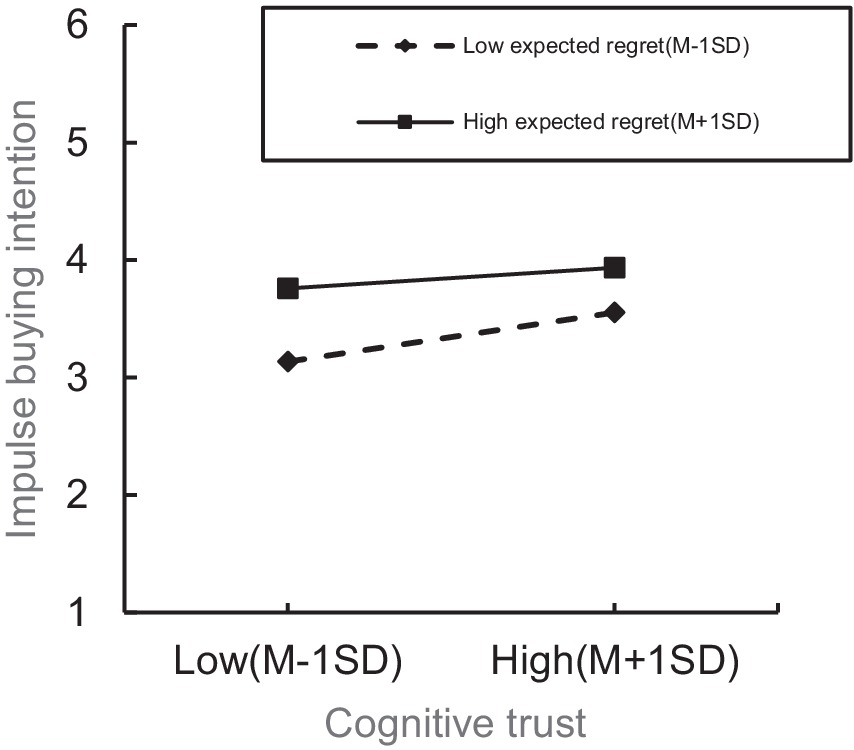
Figure 4. Moderating effect of expected regret: based on cognitive trust and impulse purchase intention.
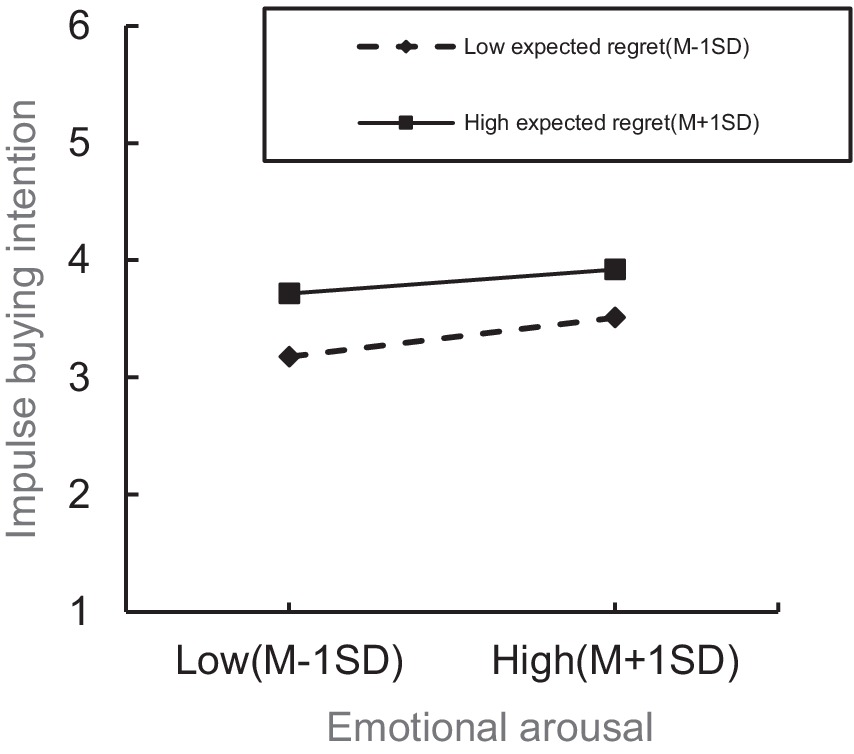
Figure 5. Moderating effect of anticipated regret: based on emotional arousal and impulse purchase intention.
5.3.4 Moderated mediation analysis
To test the hypothesized moderated mediation effects, we utilized the PROCESS macro for SPSS (Model 14) with 5,000 bootstrap samples. This approach allowed us to examine whether anticipated regret moderates the indirect effects of streamer interaction orientation on impulse buying intention through cognitive trust and emotional arousal.
Table 7 presents the conditional indirect effects at three levels of the moderator (±1 SD from the mean). The results revealed that the strength of the indirect effects varied significantly across levels of anticipated regret. Specifically, when anticipated regret was low (−1 SD), the indirect effect through cognitive trust was 0.057 (SE = 0.022, 95% CI [0.016, 0.104]), whereas this effect decreased to 0.025 (SE = 0.011, 95% CI [0.006, 0.049]) when anticipated regret was high (+1 SD). A similar pattern emerged for emotional arousal, with the indirect effect decreasing from 0.045 (SE = 0.017, 95% CI [0.015, 0.081]) at low levels of anticipated regret to 0.021 (SE = 0.010, 95% CI [0.004, 0.043]) at high levels.
The formal tests of moderated mediation are reported in Table 8. The index of moderated mediation, which quantifies the relationship between the moderator and the indirect effect, was statistically significant for both mediators. For cognitive trust, the index was −0.137 (Boot SE = 0.042, 95% CI [−0.219, −0.055]), indicating that the indirect effect significantly decreased as anticipated regret increased. The contrast between high and low levels of anticipated regret (−0.032, Boot SE = 0.016, 95% CI [−0.063, −0.003]) further corroborated this moderation effect. Similarly, for emotional arousal, the index of moderated mediation was −0.080 (Boot SE = 0.033, 95% CI [−0.146, −0.014]), with a significant high-low contrast of −0.024 (Boot SE = 0.012, 95% CI [−0.048, −0.001]).
Collectively, these findings provide robust evidence that anticipated regret negatively moderates the mediating roles of both cognitive trust and emotional arousal in the relationship between streamer interaction orientation and consumers’ impulse buying intention. Thus, Hypotheses H9a and H9b are supported.
6 Discussion
This study, based on the Cognitive-Affective System Theory and Regret Theory, explores the internal mechanisms by which the streamer’s interaction orientation influences consumers’ impulse buying intention from the perspective of anticipated regret. The study reveals: First, the streamer’s interaction orientation promotes the formation of consumers’ cognitive trust and emotional arousal, thereby inducing impulse buying intention; Second, anticipated regret significantly weakens the direct effects of cognitive trust and emotional arousal on impulse buying intention and further suppresses their mediating roles between the streamer’s interaction orientation and impulse buying intention. Supplementary tests confirmed that cognitive trust and emotional arousal play a chain mediation role between the streamer’s interaction orientation and impulse buying intention. These findings extend Cognitive-Affective System Theory by showing how streamer interactions trigger cognitive-emotional pathways in the real-time, high-pressure context of live-stream e-commerce. Specifically, the study highlights the nuanced role of anticipated regret, as proposed by Regret Theory, in modulating these pathways. Unlike prior Regret Theory studies focusing on post-purchase regret (Xin et al., 2024), this study’s focus on anticipated regret reveals how pre-purchase emotions shape cognitive trust and emotional arousal in time-sensitive live-stream settings.
Theoretically, the Cognitive-Affective System Theory posits that cognition and emotion are intertwined and mutually influential, with impulsive emotional responses often preceding rational cognitive processes, deeply influencing cognitive processing and ultimately guiding individual decision-making (Zheng et al., 2023). The streamer’s interaction orientation enables consumers to participate more actively in the live-streaming process, triggering emotional arousal. Stronger emotional arousal makes them more willing to comment, ask questions, or engage in other forms of interaction during the live stream, making consumers more likely to be attracted and develop impulse buying desires. At this time, if consumers experience anticipated regret, their impulse buying intention will be suppressed, weakening the previously established cognitive trust in the streamer and the emotional arousal triggered by interaction in the live stream, further reducing impulse buying intention.
6.1 Theoretical contribution
This study offers three important insights into live-streaming commerce. First, it enriches research on the antecedents of consumers’ impulse buying intention from the perspective of the streamer’s communication style. On the one hand, research on the communication style of streamers is still in its early exploratory stages, and relevant findings remain limited; on the other hand, studies on e-commerce live streaming often overlook the influence of streamers’ communication styles on consumers’ impulse buying intention. Therefore, this study explores the influence of streamers’ communication styles on impulse buying intention, contributing to the research on its antecedents.
Second, it provides a new perspective for explaining the impact of streamers’ interaction orientation on impulse buying intention from the dual-path perspective of consumers’ cognition and emotion. Existing studies mainly investigate the mechanisms through which streamers influence consumers’ impulse buying intention from single perspectives such as streamer professionalism, attractiveness, and credibility (Li X. et al., 2024; Xu et al., 2022). However, the interaction exhibited by consumers during live streaming involves complex emotional drivers, which single perspectives fail to fully explain. By integrating the Cognitive-Affective System Theory, this study validates the dual cognitive-emotional pathways, showing how cognitive trust and emotional arousal mediate the relationship between streamer interaction orientation and impulse buying intention. This extends the theory by applying it to the unique, real-time interactive context of live-stream e-commerce, where rapid cognitive and emotional encoding shapes consumer behavior, offering a more comprehensive understanding than previous single-path models.
Third, it expands the contextual research on how streamers’ interaction orientation influences consumers’ impulse buying intention by incorporating the perspective of consumers’ anticipated regret. Existing studies often examine the moderating mechanisms of streamers’ interaction orientation on consumers’ impulse buying intention through factors such as the live-streaming atmosphere and perceived usefulness (Wang et al., 2022a; Wang et al., 2022b; Tahar et al., 2020). However, prior research has relatively insufficiently analyzed contextual factors when exploring consumers’ regret emotions. This study advances Regret Theory by introducing anticipated regret as a moderating factor, revealing how these anticipatory emotions differentially suppress the effects of cognitive trust and emotional arousal. Unlike prior applications that primarily focus on experienced regret (Xin et al., 2024), this study’s emphasis on pre-purchase regret dynamics provides a novel lens for understanding decision-making under uncertainty in live-stream contexts, enriching the theory’s applicability to time-sensitive, high-pressure purchase scenarios.
6.2 Managerial implications
Similarly, this study provides valuable practical guidance for consumer purchasing behavior in the live-streaming context: First, streamers should strive to enhance the frequency and quality of their interactions with consumers during live-streaming, responding promptly to consumer inquiries and needs, and demonstrating sincerity and care. This would increase consumers’ cognitive trust, leading to greater confidence in the streamer and the product, thus fostering strong emotional resonance and a desire to purchase during the live-streaming session.
Second, live-streaming platforms and streamers should develop a dual-path marketing strategy that integrates both cognitive and emotional elements. On the cognitive level, virtual reality (VR) or augmented reality (AR) technologies should be employed to create an immersive product experience, helping consumers make more rational purchasing decisions; On the emotional level, users should be encouraged to share personal stories and product experiences to enhance the depth and authenticity of emotional resonance.
Third, live-streaming platforms and streamers should fully consider the psychological effects of anticipated regret. On one hand, strategies such as “no-regret after purchase” commitments and extending unconditional return and exchange policies can reduce consumers’ purchase anxiety, lower upward anticipated regret, and mitigate concerns about missing out on better future options. On the other hand, moderately stimulating consumers’ downward anticipated regret, through strategies such as time-limited discounts and limited-time sales, encourages them to seize the current opportunity to make a purchase. Meanwhile, streamers should guide consumers to appropriately consider their purchasing decisions, balancing anticipated regret with immediate gratification, and avoid the negative effects of excessive regret.
6.3 Limitations and future research
Although this study offers theoretical and practical significance in the field of consumers’ impulsive buying behavior in live-streaming contexts, it faces several limitations that require improvement in future research: First, this study collected data through online questionnaires. Future research could collect objective live-streaming data and sales records to examine how streamers’ communication styles across various products influence their sales performance. Second, individual differences were not sufficiently considered. Consumers’ impulse buying intention is influenced not only by streamers’ communication styles and consumer emotions but also by individual differences such as personal values and consumption habits. Third, this study did not explore the potential moderating effects of demographic variables, such as age, gender, and live-streaming experience, which may influence the strength of the relationships between streamer interaction orientation, cognitive trust, emotional arousal, and impulse buying intention. For instance, younger consumers (e.g., aged 21–30, as dominant in our sample) or those with frequent live-streaming exposure (e.g., 1 h daily on Douyin or Kuaishou) may exhibit stronger emotional arousal due to familiarity with the platform, while gender differences could affect trust formation. This omission limits the generalizability of the findings across diverse consumer groups. Future studies should incorporate demographic moderators, such as age, gender, and platform experience, to examine their impact on the proposed model and enhance the applicability of results to varied populations. Fourth, the sample primarily comprises Chinese young adults (aged 21–30, predominantly undergraduate students, as shown in Table 1), which raises concerns about external validity. This demographic focus may not fully represent the diverse consumer base of live-stream e-commerce globally, as cultural, economic, and technological contexts vary across regions. For example, older consumers or those in different markets (e.g., Western countries) may exhibit different responses to streamer interactions or anticipated regret due to varying consumption habits or platform familiarity. This limitation restricts the generalizability of findings to broader populations. Future research should employ more diverse samples, including consumers from different age groups, cultural backgrounds, and regions, to test the model’s applicability and enhance its external validity. Fifth, this study only examined anticipated regret as an emotional moderator, which limits the exploration of other emotional constructs that may influence impulse buying in live-stream e-commerce. For instance, fear of missing out (FOMO) could amplify impulse buying intentions due to the time-sensitive nature of live-stream promotions, while perceived social pressure from streamer interactions or peer comments may further drive emotional arousal. This omission restricts the model’s ability to capture the full spectrum of emotional drivers in this context. Future research should incorporate additional emotional constructs, such as FOMO and perceived social pressure, to provide a more comprehensive understanding of emotional influences on consumer behavior in live-stream settings.
7 Conclusion
This study elucidates the mechanisms driving impulsive buying behavior in live-stream e-commerce, demonstrating that streamer interaction orientation fosters cognitive trust and emotional arousal, which in turn stimulate impulsive buying intentions. Additionally, anticipated regret moderates these effects by suppressing impulsive tendencies. These findings advance Cognitive-Affective System Theory by clarifying the interplay of cognitive and emotional responses in real-time, high-pressure purchase contexts and extend Regret Theory by emphasizing the role of pre-purchase regret in shaping consumer decisions. Practically, the study offers actionable strategies for streamers and platforms, such as using interactive features and personalized promotions to enhance engagement while mitigating regret. By exploring anticipated regret, this study enriches consumer behavior theories in live-stream e-commerce and provides a foundation for marketing strategies that balance impulse buying with consumer satisfaction, promoting sustainable platform growth.
Data availability statement
The original contributions presented in the study are included in the article/supplementary material, further inquiries can be directed to the corresponding author.
Ethics statement
Ethical review and approval for the study on human participants was provided by the Corporate Review Committee of the School of Management, Hebei University of Geosciences (2024.05.18). Written informed consent from the [patients/participants OR patients/participants legal guardian/next of kin] was not required to participate in this study in accordance with the national legislation and the institutional requirements.
Author contributions
CW: Data curation, Formal analysis, Funding acquisition, Writing – review & editing. BC: Data curation, Investigation, Methodology, Writing – original draft, Writing – review & editing. SH: Project administration, Supervision, Writing – review & editing. JL: Conceptualization, Formal analysis, Validation, Writing – original draft.
Funding
The author(s) declare that no financial support was received for the research and/or publication of this article.
Acknowledgments
We would like to express our sincere gratitude to all the individuals and institutions that contributed to this research. We extend our heartfelt thanks to the faculty and administrative staff of Hebei GEO University and Capital University of Economics and Business for their continuous support and encouragement. Special thanks to our colleagues and peers who provided valuable feedback and suggestions during the development of this manuscript. We are also deeply grateful to the reviewers and editors for their insightful comments and constructive critiques, which have significantly improved the quality of this paper. Lastly, we acknowledge the support of our families and friends, whose understanding and patience were vital in completing this research.
Conflict of interest
The authors declare that the research was conducted in the absence of any commercial or financial relationships that could be construed as a potential conflict of interest.
Generative AI statement
The authors declare that no Gen AI was used in the creation of this manuscript.
Publisher’s note
All claims expressed in this article are solely those of the authors and do not necessarily represent those of their affiliated organizations, or those of the publisher, the editors and the reviewers. Any product that may be evaluated in this article, or claim that may be made by its manufacturer, is not guaranteed or endorsed by the publisher.
Footnotes
References
Bai, X., Aw, E. C., Tan, G. W., and Ooi, K. B. (2024). Livestreaming as the next frontier of e-commerce: a bibliometric analysis and future research agenda. Electron. Commer. Res. Appl. 65:101390. doi: 10.1016/j.elerap.2024.101390
Barta, S., Gurrea, R., and Flavián, C. (2023). Using augmented reality to reduce cognitive dissonance and increase purchase intention. Comput. Hum. Behav. 140:107564. doi: 10.1016/j.chb.2022.107564
Barton, B., Zlatevska, N., and Oppewal, H. (2022). Scarcity tactics in marketing: a meta-analysis of product scarcity effects on consumer purchase intentions. J. Retail. 98, 741–758. doi: 10.1016/j.jretai.2022.08.004
Beatty, S. E., and Ferrell, M. E. (1998). Impulse buying: Modeling its precursors. J. Retail. 74, 169–191. doi: 10.1016/S0022-4359(99)80092-X
Chen, J., Luo, J., and Zhou, T. (2024). Research on determinants affecting users’ impulsive purchase intention in live streaming from the perspective of perceived live streamers’ ability. Behav Sci 14:190. doi: 10.3390/bs14030190
Chen, J., and Wu, Y. (2024). Would you be willing to purchase virtual gifts during esports live streams? Streamer characteristics and cultural traits. Comput. Human Behav. 152:108075. doi: 10.1016/j.chb.2024.108075
Do, D. K. X., Rahman, K., and Robinson, L. J. (2020). Determinants of negative customer engagement behaviours. J. Serv. Mark. 34, 117–135. doi: 10.1108/JSM-07-2019-0236
Ezeudoka, B. C., and Fan, M. (2024). Exploring the impact of digital distrust on user resistance to e-health services among older adults: the moderating effect of anticipated regret. Humanit. Soc. Sci. Commun. 11, 1–19. doi: 10.1057/s41599-023-01407-9
Guo, Y., Zhang, K., and Wang, C. (2022). Way to success: understanding top streamer’s popularity and influence from the perspective of source characteristics. J. Retail. Consum. Serv. 64:102786. doi: 10.1016/j.jretconser.2022.102786
Gupta, A. S., and Mukherjee, J. (2022). Long-term changes in consumers’ shopping behavior post-pandemic: an exploratory study. Int. J. Retail Distrib. Manag. 50, 1518–1534. doi: 10.1108/IJRDM-04-2022-0214
Karl, M., Chien, P. M., and Ong, F. (2021). Impulse buying behaviour in tourism: a new perspective. Ann. Tour. Res. 90:C. doi: 10.1016/j.annals.2021.103196
Kaur, K., and Sharma, T. (2024). Impulse buying in the digital age: an exploration using systematic literature review approach. J. Consum. Behav. 23, 2553–2584. doi: 10.1002/cb.1977
Kim, D. Y., and Kim, H. Y. (2021). Trust me, trust me not: A nuanced view of influencer marketing on social media. J. Bus. Res. 134, 223–232. doi: 10.1016/j.jbusres.2021.05.024
Lee, C.-H., and Chen, C.-W. (2021). Impulse buying behaviors in live streaming commerce based on the stimulus-organism-response framework. Information 12:241. doi: 10.3390/info12060241
Liao, J., Chen, K., Qi, J., Li, J., and Yu, I. Y. (2023). Creating immersive and parasocial live shopping experience for viewers: the role of streamers’ interactional communication style. J. Res. Interact. Mark. 17, 140–155. doi: 10.1108/JRIM-04-2021-0114
Li, B., Hu, M., Chen, X., and Lei, Y. (2021). The moderating role of anticipated regret and product involvement on online impulsive buying behavior. Front. Psychol. 12:732459. doi: 10.3389/fpsyg.2021.732459
Li, J., Zhang, S., and Ao, W. (2023). Why is instant messaging not instant? Understanding users’ negative use behavior of instant messaging software. Comput. Hum. Behav. 142:107655. doi: 10.1016/j.chb.2023.107655
Li, L., Chen, X., and Zhu, P. (2024a). How do e-commerce anchors’ characteristics influence consumers’ impulse buying? An emotional contagion perspective. J. Retail. Consum. Serv. 76:103587. doi: 10.1016/j.jretconser.2024.103587
Li, L., Feng, Y., and Zhao, A. (2024b). An interaction–immersion model in live streaming commerce: the moderating role of streamer attractiveness. J. Mark. Anal. 12, 701–716. doi: 10.1057/s41270-023-00167-9
Liu, J., Zhou, X., and Wang, Q. (2023). The influence of entrepreneurial leadership on employee improvisation in new ventures: based on cognitive-affective processing system framework. Kybernetes 52, 3566–3587. doi: 10.1108/K-06-2022-0510
Li, X., Huang, D., Dong, G., and Wang, B. (2024). Why consumers have impulsive purchase behavior in live streaming: the role of the streamer. BMC Psychol. 12:129. doi: 10.1186/s40359-024-01988-4
Loomes, G., and Sugden, R. (1982). Regret theory: An alternative theory of rational choice under uncertainty. Econ J 92, 805–824. doi: 10.2307/2232492
Lo, P. S., Dwivedi, Y. K., Tan, G. W. H., Ooi, K. B., Aw, E. C. X., and Metri, B. (2022). Why do consumers buy impulsively during live streaming? A deep learning-based dual-stage SEM-ANN analysis. J. Bus. Res. 147, 325–337. doi: 10.1016/j.jbusres.2022.06.053
Lyu, J., Liang, Y. D., and Nagarajan, D. V. (2024). Optimizing live streaming engagement through store atmospheric cues: exploring prosocial behavior and social comparison—insights from streamers and viewers. Internet Res. 34, 76–102. doi: 10.1108/INTR-03-2023-0143
Ma, X., Chen, H., Lang, X., Li, T., Wu, N., and Duong, B. (2024). Research on the impact of streamers’ linguistic emotional valence on live streaming performance in live streaming shopping environments. J. Retail. Consum. Serv. 81:104040. doi: 10.1016/j.jretconser.2024.104040
Meng, L. M., Duan, S., Zhao, Y., Lü, K., and Chen, S. (2021). The impact of online celebrity in livestreaming E-commerce on purchase intention from the perspective of emotional contagion. J. Retail. Consum. Serv. 63:102733. doi: 10.1016/j.jretconser.2021.102733
Mischel, W., and Shoda, Y. (1995). A cognitive-affective system theory of personality: Reconceptualizing the study of personality. Psychol. Rev. 102, 246–268. doi: 10.1037/0033-295X.102.2.246
Mishra, R., Singh, R. K., and Koles, B. (2021). Consumer decision-making in omnichannel retailing: literature review and future research agenda. Int. J. Consum. Stud. 45, 147–174. doi: 10.1111/ijcs.12605
Neneh, B. N. (2019). From entrepreneurial intentions to behavior: The role of anticipated regret and proactive personality. J. Vocat. Behav. 112, 311–324. doi: 10.1016/j.jvb.2019.04.005
Pruessner, L., Barnow, S., Holt, D. V., Joormann, J., and Schulze, K. (2020). A cognitive control framework for understanding emotion regulation flexibility. Emotion 20, 21–29. doi: 10.1037/emo0000582
Rotter, J. B. (1975). Some problems and misconceptions related to the construct of internal versus external control of reinforcement. J. Consult. Clin. Psychol. 43, 56–67. doi: 10.1037/h0076301
Sheth, J. N. (1975). Buyer-seller interaction: a conceptual framework. Adv Consumer Res, 3, 131–140.
Shi, W., Li, F., and Hu, M. (2023). The influence of atmospheric cues and social presence on consumers’ impulse buying behaviors in e-commerce live streaming. Electron. Commer. Res. 23, 1–29. doi: 10.1007/s10203-023-00801-3
Sijtsema, J. J., Zeelenberg, M., and Lindenberg, S. M. (2021). Regret, self-regulatory abilities, and well-being: their intricate relationships. J Happiness Stud 22, 1–26. doi: 10.1007/s10902-020-00273-9
Singh, S., and Vijay, T. S. (2024). Technology roadmapping for the e-commerce sector: a text-mining approach. J. Retail. Consum. Serv. 81:103977. doi: 10.1016/j.jretconser.2024.103977
Tahar, A., Riyadh, H. A., Sofyani, H., and Purnomo, W. E. (2020). Perceived ease of use, perceived usefulness, perceived security and intention to use e-filing: the role of technology readiness. J. Asian Financ. Econ. Bus. 7, 537–547. doi: 10.13106/jafeb.2020.vol7.no9.537
Tandon, A., Laato, S., Islam, N., and Dhir, A. (2024). Social comparisons at social networking sites: how social media-induced fear of missing out and envy drive compulsive use. Internet Res. 34, 128–151. doi: 10.1108/INTR-04-2023-0277
Van Kleef, G. A., and Côté, S. (2022). The social effects of emotions. Annu. Rev. Psychol. 73, 629–658. doi: 10.1146/annurev-psych-010220-031742
Wang, Y., Lu, H., and Wang, D. (2020). Buy or not: how the presence of others affects the occurrence of consumers’ impulsive buying behavior. J Contemp Market Sci 3, 207–224. doi: 10.1108/JCMS-10-2020-0339
Wang, Y., Lu, Z., Cao, P., Chu, J., Wang, H., and Wattenhofer, R. (2022a). How live streaming changes shopping decisions in E-commerce: a study of live streaming commerce. Comput. Support. Coop. Work 31, 701–729. doi: 10.1007/s10606-022-09425-3
Wang, Y., Pan, J., Xu, Y., Luo, J., and Wu, Y. (2022b). The determinants of impulsive buying behavior in electronic commerce. Sustainability 14:7500. doi: 10.3390/su14127500
Wongkitrungrueng, A., and Assarut, N. (2020). The role of live streaming in building consumer trust and engagement with social commerce sellers. J. Bus. Res. 117, 543–556. doi: 10.1016/j.jbusres.2020.06.032
Xin, M., Liu, W., and Jian, L. (2024). Live streaming product display or social interaction: how do they influence consumer intention and behavior? A heuristic-systematic perspective. Electron. Commer. Res. Appl. 67:101437. doi: 10.1016/j.elerap.2024.101437
Xu, Q., Kim, H., and Billings, A. C. (2022). Let’s watch live streaming: how streamer credibility influences brand attitude in esports streamer marketing. Commun. Sport 10, 271–290. doi: 10.1177/21674795221113176
Yang, G., Chaiyasoonthorn, W., and Chaveesuk, S. (2024). Exploring the influence of live streaming on consumer purchase intention: a structural equation modeling approach in the Chinese E-commerce sector. Acta Psychol. 249:104415. doi: 10.1016/j.actpsy.2024.104415
Yang, J., Cao, C., Ye, C., and Shi, Y. (2022). Effects of interface design and live atmosphere on consumers’ impulse-buying behaviour from the perspective of human–computer interaction. Sustainability 14:7110. doi: 10.3390/su14127110
Zeelenberg, M., Beattie, J., Van der Pligt, J., and de Vries, N. K. (1996). Consequences of regret aversion: effects of expected feedback on risky decision making. Organ. Behav. Hum. Decis. Process. 65, 83–94. doi: 10.1006/obhd.1996.0008
Zhang, M., Liu, Y., Wang, Y., and Zhao, L. (2022). How to retain customers: understanding the role of trust in live streaming commerce with a socio-technical perspective. Comput. Hum. Behav. 127:107052. doi: 10.1016/j.chb.2021.107052
Zhang, S., Wakefield, R., Huang, J., and Li, X. (2021). Exploring determinants of consumers’ attitudes toward real-time bidding (RTB) advertising. Inf. Technol. People 34, 496–525. doi: 10.1108/ITP-12-2019-0536
Keywords: impulsive buying, anticipated regret, cognitive-affective system theory, cognitive trust, emotional arousal, live-streaming shopping
Citation: Wang C, Chen B, Hu S and Li J (2025) Streamer interaction and consumer impulsive buying in live-stream commerce: the mediating roles of trust and emotional arousal with anticipated regret as boundary condition. Front. Commun. 10:1547639. doi: 10.3389/fcomm.2025.1547639
Edited by:
Steven Bellman, University of South Australia, AustraliaReviewed by:
Fayyaz Hussain Qureshi, Oxford Business College, United KingdomAdi Santoso, Telkom University, Indonesia
Copyright © 2025 Wang, Chen, Hu and Li. This is an open-access article distributed under the terms of the Creative Commons Attribution License (CC BY). The use, distribution or reproduction in other forums is permitted, provided the original author(s) and the copyright owner(s) are credited and that the original publication in this journal is cited, in accordance with accepted academic practice. No use, distribution or reproduction is permitted which does not comply with these terms.
*Correspondence: Shoufeng Hu, aHVzaG91ZmVuZ0BjdWViLmVkdS5jbg==
†These authors have contributed equally to this work
 Chengmin Wang1†
Chengmin Wang1† Baohua Chen
Baohua Chen